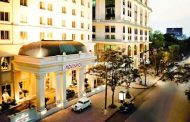The northern province of Hung Yen is branding itself as the gateway to Hanoi City, in an effort to attract tourists and market its cultural sites and products.
In its tourism development plan, recently approved by the provincial authorities, the ancient Phố Hiến (Hiến Street) relic complex and the Hồng (Red) River eco-travelling lodge have been listed as trademarks of Hung Yen tourism.
The province has set a goal to develop tourism industry as a key sector for economic development. The province seeks to exploit the abundance of local products, as well as improve facilities, and promote its cultural identity.
Vice Chairman of the Hung Yen People’s Committee Nguyen Duy Hung said the province has set out a variety of basic targets for development, in which priority was given to the development of the tourism industry; facilities and products that appeal to tourists; and particularly the protection of natural resources and the environment.
“The province also directed local tourism authorities to focus on improving transport infrastructure and urged the business sector to invest in this field”, said Hung.
He said, on the one hand, the province will focus on domestic markets, mainly attracting tourists from Hanoi and other provinces in the Red River Delta as well as other provinces in the country
On the other hand, he added, it will expand into international markets including those in Europe, Australia, and North America.
Those in Northeast Asia and ASEAN member countries will also be considered, according to Hung.
Phố Hiến preservation
Hung Yen has, for several years, undertaken measures to preserve the ancient Phố Hiến relic complex, which is recognized as a special national heritage site.
Numerous projects have been implemented in the locality since 1997 to restore Phố Hiến, in a bid to protect its cultural and historic value. Repairs have been made to the Xích Đằng Temple of Literature, the Chuông Pagoda, the Mẫu (Goddess) Temple, and the Đông Đô Quảng Hội and Hiến Pagodas, among others.
Now the province has cordoned off nearly 2,000 hectares of land to carry out a master plan to preserve ancient Phố Hiến in line with local tourism development.
Furthermore, the province has paid consistent attention to restoring Phố Hiến traditional cultural festivals in order to maximize the tourism potential of the locality. Worshipping places in the complex remain particularly popular among domestic tourists.
The Phố Hiến relic complex contains countless pagodas and temples built in Vietnamese, Chinese and western architectural styles. A Catholic church boasting a gothic architectural style was built in Phố Hiến during the 17th century.
The complex was also once a bustling commercial port on the Red River, reaching its heyday in the 17th and 18th centuries. Phố Hiến was second only to the imperial capital city of Thăng Long as a trading point. It was well-known among foreign traders, especially those from China, the Netherlands, Japan and France.
























